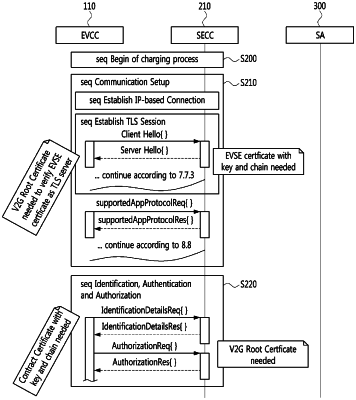| CPC G06F 21/44 (2013.01) [B60L 53/66 (2019.02); B60L 53/68 (2019.02); G06F 21/30 (2013.01); G06F 21/31 (2013.01)] | 14 Claims |

|
1. A charging control method, comprising:
performing, by an electric vehicle supply equipment (EVSE), a charging session initiation procedure with an electric vehicle (EV);
calculating, by the EVSE, a session script hash associated with a charging session;
receiving, by the EVSE, a session access request from a user device, the user device receiving a session token from the EV and being connected to the EVSE remotely via a wireless communication or a mobile communication, wherein the session token is generated based on a session script hash calculated by the EV;
requesting, by the EVSE, session authentication to the user device based on a result of confirming session identification information, identification information of the EVSE, and identification information of an electric vehicle communication controller (EVCC) included in the session access request;
receiving, by the EVSE, a session script authentication value as a result of the session authentication from the user device, the session script authentication value being derived by inputting a random number generated by the EVSE, a random number generated by the user device, and a session script hash of the corresponding session to a hash function; and
determining, by the EVSE, whether to allow the user device access to the EVSE to monitor or control the charging session based on a result of confirming the session script authentication value.
|